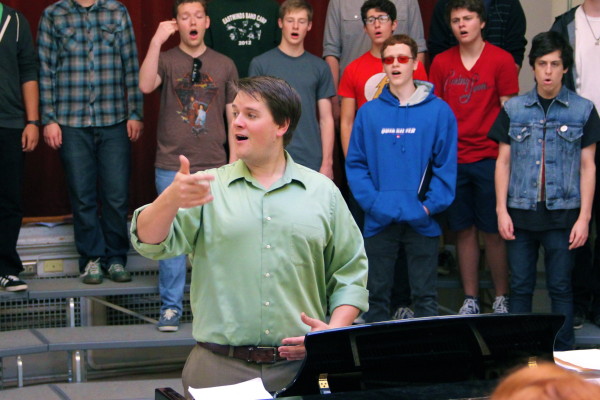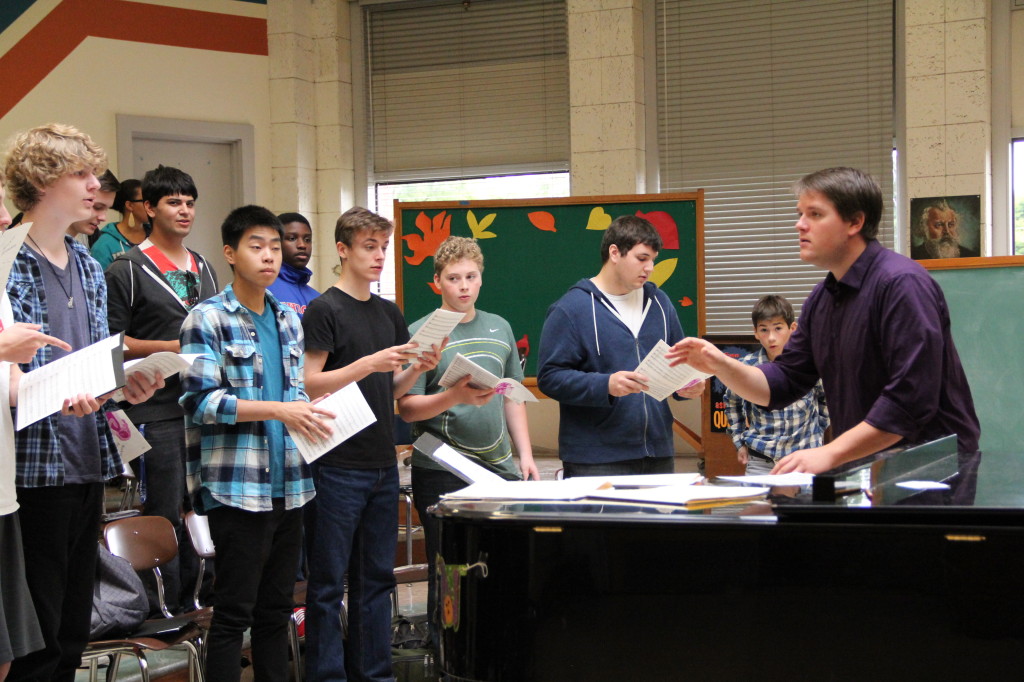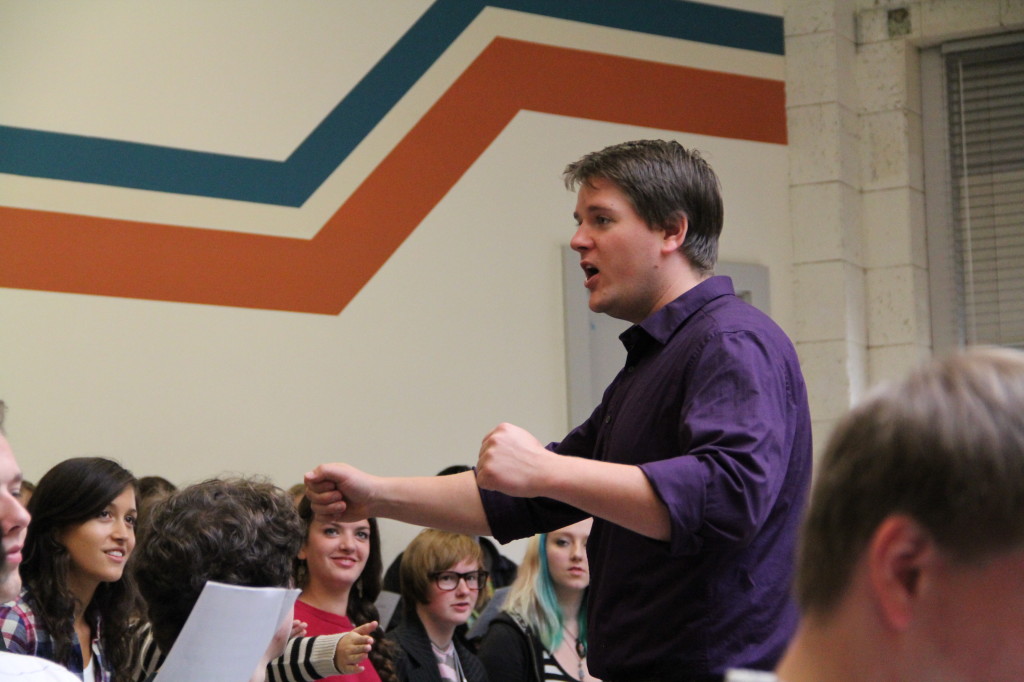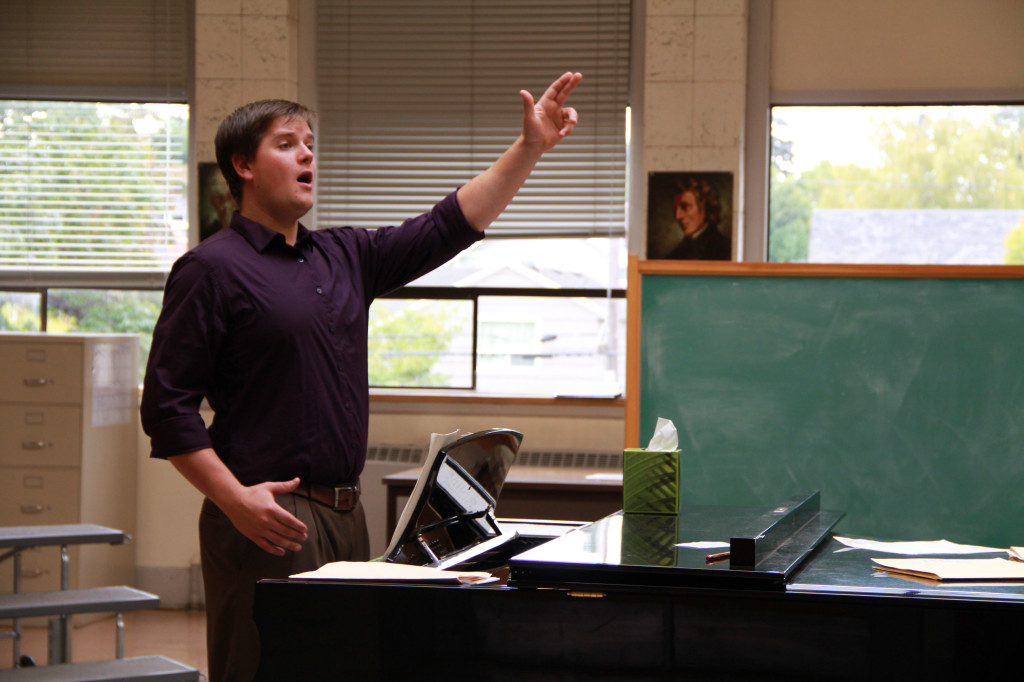
At 17, John Eisemann knew he wanted to be a choir teacher. He was in his first year of the Grant Royal Blues, a lead singer and guitar player in a rock band, and he saw his choir teacher as an inspiration. He dreamed of coming back someday to teach music at Grant. “I never expected it would actually happen,” he says now.
When two-year Grant choir director Beth Hembd returned to her home in Colorado this summer, Grant was left scrambling to find a new director. Eisemann, who had recently graduated from college with a double major in music and education, started hearing from his old teachers at Grant about the position. He applied right away, scoring an interview with Principal Vivian Orlen, Vice Principal Kristyn Westphal and a couple of students.
“We felt that Mr. Eisemann really stood out,” Westphal recalls. “We loved his enthusiasm. He gets so passionate about music and teaching students. He was also the only candidate who was really passionate about Grant.”
“I’m still not quite sure how I got hired here,” Eisemann laughs. A last-minute addition to the staff, his contract wasn’t signed until the day before school started. Now that he’s here, Eisemann, now 24, plans to stay. “I would love nothing more than to build a permanent position here and build a program.”
Eisemann believes the Grant choral program hasn’t been going anywhere since he graduated from Grant in 2006. After getting the job, he walked into the choir room for the first time in six years and noticed very little change, though the room was more neglected. Papers were strewn everywhere, the choir robes weren’t properly cleaned, and the office was a mess. It “looked like someone had just left it there,” he remembers.
According to Eisemann, Grant used to be known as a singing school, with choirs made up of more than two hundred members. He feels there have been no long-term goals or vision for the choir program in recent years. “I want Grant to be that singing school again.”
Born and raised in Portland, Eisemann is the oldest of Meg and Eric Eisemann’s three boys. When the boys were young, their parents would sing to them at bedtime. “We wanted them to learn the language of music,” Eric Eisemann, a land-use planner, explains. Because of this, it was an Eisemann family rule that all the boys had to play piano from first to eighth grade.
John Eisemann attended a musical preschool, where he grew accustomed to the sounds of different instruments and learned with music incorporated into everyday lessons. He rode bikes, played with Legos, listened to the radio and hung out with his core group of friends whom he’s stayed close to since elementary school.
Around fourth grade, Eisemann began contributing to adult conversations about topics like politics. Looking back, he still thinks his opinions were mostly right. “He did have kind of a big mouth,” brother William remembers. “But his confidence was well deserved.”
 By the time he reached eighth grade, Eisemann was ready to end piano lessons. “I always enjoyed playing the piano, but I hated practicing,” he says. Eisemann told his parents he wanted to focus on guitar instead.
By the time he reached eighth grade, Eisemann was ready to end piano lessons. “I always enjoyed playing the piano, but I hated practicing,” he says. Eisemann told his parents he wanted to focus on guitar instead.
Meg Eisemann, who works for the Multnomah County Library, said he only wanted to play guitar because it was “sexy.” He formed a band with two of his middle school friends after he started.
In his freshman year at Grant, the band added a fourth member and called itself “Bad Tommy.” Eisemann was a lead guitarist and singer, along with his best friend, David Streckert. The two were sure that girls liked guys who can sing, so they auditioned and joined the a cappella choir in their sophomore year.
Eisemann remembers thinking he’d learn to sing, score an easy A in the class and get a girlfriend. Instead, a cappella soon became one of his favorite classes. “I was taken,” he says.
The choir director at the time, Doree Jarboe, was a big part of his enjoyment. “She had a knack to inspire kids not only to sing but to do the right thing,” Eisemann says.
They struck up a friendly relationship. After his graduation, they stayed in contact, reconnecting during each of Eisemann’s breaks from college. “He was just a star,” Jarboe recalls.
She’d held the choir members to high expectations and Eisemann rose to the challenge. He sang in the Royal Blues during his junior and senior years, and Jarboe says that he took on a leadership role. When the class got rowdy, Eisemann would be the one to tell everyone to settle down. “They would listen to him. They loved him. They thought he was cool,” Jarboe says now.
Eisemann also participated in the theater program for all four of his years at Grant. His first main show was in “Les Misèrables,” where he played 27 different parts. Junior year, he moved up several rungs on the ladder when he starred as the baker in the musical “Into the Woods.” In Eisemann’s senior year, he directed the one act “Visitors From Philadelphia” and performed as the Tin Man in “The Wizard of Oz.”
Bad Tommy also lasted all four years at Grant and turned out to be a relatively successful high school band. Eisemann recalls an average show drawing a crowd of 200. The band put out two different CDs and made money from their performances. As senior year drew to a close, there was talk of taking one year off to continue with the band, but in the end the members chose to go directly to college.
 Eric Eisemann remembers sitting at the dining room table and discussing options for college for his oldest son. John Eisemann thought he might want to become a history professor. His dad pointed out: “Your brother William reads history books for fun. You don’t. What do you do for fun?”
Eric Eisemann remembers sitting at the dining room table and discussing options for college for his oldest son. John Eisemann thought he might want to become a history professor. His dad pointed out: “Your brother William reads history books for fun. You don’t. What do you do for fun?”
Eisemann replied, “I play music.” His parents advised him to follow his heart.
That’s when the idea of becoming a choir teacher sprouted. Jarboe recalls encouraging him to follow her path in music. “One day, we were joking around and he said, ‘You know what? I’m going to come back and take your job.’ And I said, ‘Do it.’”
Eisemann graduated in 2006. He went to the small, liberal arts-oriented Knox University in Galesburg, Illinois. “Music in college was everything,” he says. “I took every music class I could get my hands on.”
Knox is where he discovered the academic side of music. He sang in the choir all four years, which is how he met his girlfriend, Jen Milius.
Milius had also joined the choir freshman year, but the two didn’t start dating until senior year. Eisemann says there wasn’t a particular time when it happened: their relationship changed gradually and without ceremony. After their graduation, Milius, a graphic designer, moved back to Portland with him to live at his parents’ house while searching for their own place.
Eisemann didn’t graduate until the fall of 2010, when he finished his student teaching. Then he returned home to live with his parents and work full time at Billy Heartbeats, a diner in the Lloyd Center where he worked in high school. In the meantime, Eisemann began the process of switching his state teaching license from Illinois to Oregon. He admits to some procrastination, explaining that there was a lot of paperwork.
In June 2011, he applied to the substitute teacher pool for Portland Public Schools, but wasn’t accepted because of a requirement for student teaching to be completed within the district. However, a music teacher friend got him registered as a substitute in the Gresham-Barlow school district, so Eisemann began substituting as a music teacher in February 2012.
In August, Eisemann got a call from his old theater teacher, Chris Lane, who told him the music teacher position was open but not yet posted on the official website. He quickly prepared a resume and biked to Grant, hoping to meet with Westphal. After waiting in the office for a while, Eisemann had to leave for work, so he left his paperwork in the office. The position was posted online that afternoon and he applied during a break at work.
A few days after interviewing with the administrative staff, Eisemann got a call from the Portland district’s human resources department offering him the position. They called half an hour before the office closed for Labor Day weekend, so he was emailed the paperwork and told to come in after the holiday to sign the contract.
Through the hectic holiday weekend working fulltime at the diner, Eisemann was left with very little time to prepare. On the first day of school, he remembers feeling disappointed in himself that he had nothing ready for his students. Even now, Eisemann is still struggling to catch up. At the same time, he recognizes that he simply hasn’t had enough time to prepare for the three offered choir classes. Also, he says he had no idea how hard it would be to teach.
Eisemann claims to hate hard work and says he skirts responsibility. However, those around him know differently. His brother William says: “Even if he hates it, he’s the kind of person to get it done.” He suggests that what most people consider hard work is different from what John Eisemann thinks of it.
 Regardless, Eisemann plans to challenge the members of Grant’s choirs to excel. He wants choir to become something everyone in the community can be proud of. Another goal is for the choir to reflect the ethnic and racial demographics of Grant. Eisemann says the choir has been almost entirely white for years and he hopes to build a more diverse group of singers.
Regardless, Eisemann plans to challenge the members of Grant’s choirs to excel. He wants choir to become something everyone in the community can be proud of. Another goal is for the choir to reflect the ethnic and racial demographics of Grant. Eisemann says the choir has been almost entirely white for years and he hopes to build a more diverse group of singers.
Similarly, he wants choir to draw more boys. Noting that he never dated anyone he didn’t meet in choir, he jokingly advises boys at Grant: “You join choir and you get dates, man!”
Remembering instances of classism during his Royal Blues days, Eisemann plans to unify all the choirs because he believes no singer is more valuable to the program than another. To him, “each step is just as important.”
Streckert, still one of Eisemann’s closest friends, believes Eisemann’s past involvement with a highly successful Grant choir will help him as the choir director today. “He’s going to bring back the heritage of choral excellence.”
Eisemann is bursting with determination and ideas to rebuild. He wants to teach a music theory class, start a hip-hop ensemble, and even create an orchestra. With boundless energy, his excitement is infectious. “I will never be boring,” he says.
Juggling his role as choir director and continuing to work at Billy Heartbeats means Eisemann’s schedule is pretty full. “Learning to work hard and relax hard is important,” he says.
In the free time he has left, Eisemann does a lot of cooking with his dad. The two can turn a regular Friday night into hours of elaborate cooking. Eisemann says he loves going to the grocery store because it helps him to decompress, thinking about what to cook. His dad says: “He loves to make things, whether it’s music or food, because it brings him joy and brings other people joy.”
Eisemann also spends free time on music. He sings along with Milius in the professional Portland Symphonic Choir. “I sing all the time. I sing everywhere I go, quite obnoxiously,” he says.
Students like his approach. “He was really excited to be there,” says Claire Leipzig, a junior in Royal Blues and an a cappella member. “I like that he was in the Grant choir at the height of the choir, so he knows what it can be, and he can bring it back to that.”
Senior Dennis Baumgardner agrees. “He’s bringing the choir in a new direction, which was greatly needed,” says Baumgardner, also a Royal Blues member. “We used to be all loosey-goosey and not really professional like we should have been.”
But now, Eisemann plans to work them hard and “make a big splash.”
“He’s willing to go to great lengths to build a big choir,” says his brother, William.
Dad Eric agrees. “He’s going to try and make his mark.”



